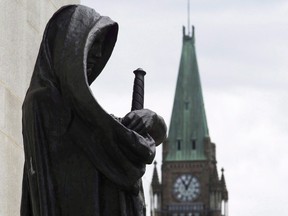
Three Supreme Court of Canada decisions released Friday made two things clear.
First, mandatory minimum sentences for some gun crimes are constitutional and thus are not cruel and unusual punishment.
From our newsroom to your inbox at noon, the latest headlines, stories, opinion and photos from the Toronto Sun.
Thanks for signing up!
A welcome email is on its way. If you don't see it, please check your junk folder.
The next issue of Your Midday Sun will soon be in your inbox.
Second, that the Supreme Court endorses the practice of judges creating hypothetical cases — that is fabricated crimes with imaginary accused, in addition to the actual accused and the facts before them — in ruling on the constitutionality of mandatory minimum sentences.
This has been common practice in our courts based on a 1987 Supreme Court decision, in a country where Canadians have been raised on the idea judges decide cases solely on the basis of the facts before them.
In reality, the Supreme Court supports the use of hypothetical cases, as long as they are “reasonable” in relation to determining whether a mandatory sentence is constitutional.
This practice, which has no equivalent in the U.S., has resulted in decisions where judges have ruled that in the case before them a mandatory minimum sentence was justified, but that in a hypothetical case it would be cruel and unusual punishment and thus not constitutional.
In the three rulings by the Supreme Court Friday involving gun crimes, it rejected the use of hypothetical cases in two lower court rulings, declaring the mandatory minimum sentences imposed were constitutional, and supported it in the third.
In that case, the Supreme Court ruled the mandatory minimum sentence was unconstitutional, because in a reasonable hypothetical case, it would have been cruel and unusual punishment.
With regard to that decision, the Trudeau government had already eliminated the use of mandatory minimum sentences for that crime, as it has for a number of other sentencing provisions that were passed by the Harper government.
However, mandatory minimum sentences for other gun offences and crimes, remain on the books.
Supporters of the use of hypothetical cases argue it is necessary to ensure justice and fairness in judicial rulings because no one should be convicted under a law that would be unconstitutional in other, reasonably similar, circumstances.
Opponents, including some judges, argue the use of hypotheticals undermines the administration of justice because it means judges are making up facts to arrive at decisions, which should be based on the facts before them.
We agree with the critics.


